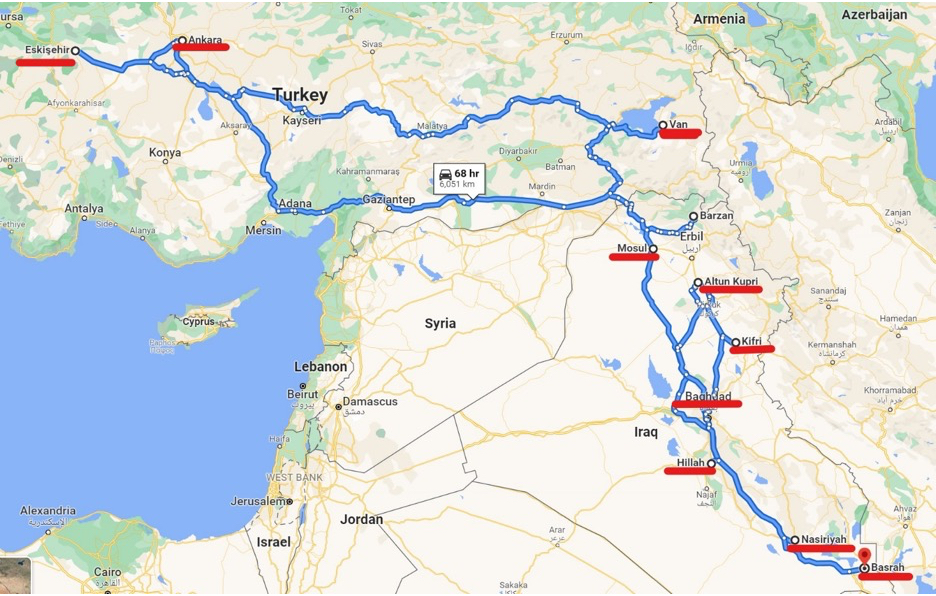
Sheik Ahmed Par Excellence 1896 - 1969
Bilateral and multi-lateral treaties of post WWI
The victors of World War I. (WWI) after dividing Kurdistan starting from 1921, they signed many bilateral and multi-lateral treaties with new regimes not just denied the very existence of Kurds and Kurdistan but actively cooperating against any legitimate Kurdish rights to protect their new political order they created2. Sheik Ahmed Par Excellence a spiritual leader with depth since of patriotism had to deal with new reality. His thinking and values based on protection of humanity, diversity, equal rights, women rights, social justice and protection of nature; therefore, he could not accept what has been imposed on Kurdistan. As stated by St. Thomas Aquinas, “Any law that degrades human personality is unjust.”(As quoted by Martin Luther King)3, clearly new laws and order were unjust and against any humanitarian law.
He build and expend on relationship establish during Sheik Abdulselam. Now that Kurdistan was divided to many pieces’ communication was more difficult. The cities are shown in the maps were major Kurdish leaders and activists were located and they were constantly in touch with Par Excellence and debating different alternatives to save Kurdistan or at least obtain an autonomy. In 1926 there were an attempt to establish an independent Kurdistan from Urmiye, Hakari, Barzan, Rewanduz to Slemani but international power will not allow anything on the name of Kurdistan happened4. However, Par Excellence never stop the struggle. Sometimes he will use diplomacy, negotiation, and sometimes lead armed resistance. In addition, he was constantly negotiating with the International powers for protection of Kurdistan.
Political exile and jail

2 TREATY OF FRIENDSHIP: PERSIA AND RUSSIA 26 February-12 December 1921 (Pp417 – 421 Hurewitz), TREATY OF FRIENDSHIP: TURKEY AND RUSSIA 16 March 1921 (Pp. 422 – 424), AGREEMENT (ANKARA) FOR THE PROMOTION OF PEACE: FRANCE AND THE PROVISIONAL (NATIONALIST) GOVERNMENT OF TURKEY 20 October 1921 (P. 424 – 427 Hurewitz), “TREATY OF ALLIANCE: GREAT BRITAIN AND IRAQ 10 October 1922 (P. 438 Hurewitz), THE (LAUSANNE) TREATY OF PEACE WITH TURKEY AND THE ACCOMPANYING STRAITS CONVENTION 24 July 1923 (Pp. 446 – 454 Hurewitz), FRONTIER TREATY: THE UNITED KINGDOM AND IRAQ AND TURKEY 5 June 1926 (Pp 470 – 473), TREATY OF PREFERENTIAL ALLIANCE: THE UNITED KINGDOM AND IRAQ 30 June 1930 (Ratifications exchanged, Baghdad, 26 January 1931; superseded, 5 April 1955, by United Kingdom’s accession to Turco-Iraqi Pact)” (Pp 505 – 508 Hurewitz ), and TREATY OF NONAGGRESSION (SA’DABAD PACT): AFGHANISTAN, IRAN, IRAQ AND TURKEY 8 July 1937 (Ratifications deposited, Tehran, 25 June 1938) (Pp. 541 – 543 Hurewitz )
3 AFRICAN STUDIES CENTER – UNIVERSITY OF PENNSYLVANIA Retrieved February 20, 2021 from https://www.africa.upenn.edu/Articles_Gen/Letter_Birmingham.
4 Records of the Kurds: territory, revolt and nationalism, 1831-1979. British documentary sources. Volume 7 P.162
5 Omissi, David E. (1990). Air power and colonial control: the Royal Air Force, 1919-1939. Manchester [England] ; New York : New York, NY P. 37)
6 Burdett, A. L. P. (2005). Iraq: defense intelligence 1920-1973. Slough: Archive Ed. Vol.3 P. 3
7 Burdett, A. L. P. (2005). Iraq: defense intelligence 1920-1973. Slough: Archive Ed. Vol. 2 P. 709
8 Burdett, A. L. P. (2005). Iraq: defense intelligence 1920-1973. Slough: Archive Ed. Vol. 3 Pp. 165 – 167
9 Barzani, Mesud (2017) Barzani Ve Kürt Ulusal Özgürlük Hareketi Vol I. [Barzani and Kurdistan National Liberation Movement Vol I.] Doz Basim Yayin. Istanbul, Turkey Pp. 45 and 329

